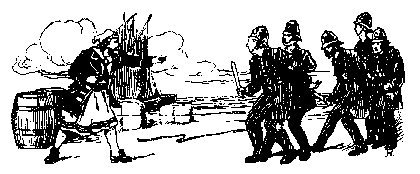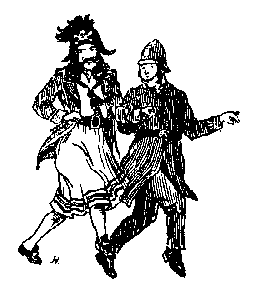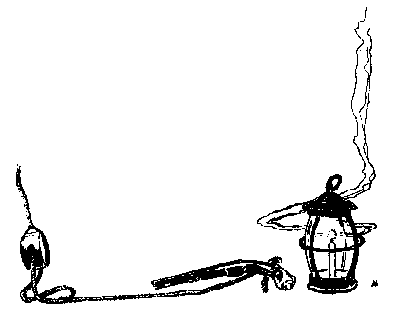Gilbert & Sullivan Opera
A History and a Comment
by H. M. Walbrook
CHAPTER VI.
SOME ANCESTORS AND AN ESCUTCHEON.

The Pirates of Penzance, or the Slave of Duty was produced at the Opéra Comique on April 3rd, 1880. There had previously been given one of those absurd "copyright performances" at which (to secure the copyright of the work) the piece is gone through anyhow, a placard is exhibited in the box-office, and one spectator is allowed to pay a guinea for a seat, the amount being handed back to him at the end of the performance! In the case of The Pirates of Penzance this solemn farce was enacted at the Bijou Theatre, Paignton, and the interest is entirely local: it is, of course, mentioned with pride in all the local "Guides." In the London production the part of Mabel Stanley was enacted by one of the most beautiful women and gifted vocalists who have appeared in comic opera in England — Marion Hood. In this opera she made her début on the London stage, and her dark and rather tragic beauty and lovely voice made her famous in an evening.
The piece satirizes (i.) the snobbery of the nouveau riche in the person of Major-General Stanley; (ii.) the shallowness of the pose of "respectability "; (iii.) the exhibition of an over-mature feminine sentimentality; and (iv.), in terms of the broadest comicality, the conscientious solemnity of the police constabulary. The Major-General has bought Tremorden Castle and its estate, containing a ruined chapel, and he claims the members of the old family who once possessed the place and now lie buried beneath its crumbling walls, as his ancestors "by purchase," and their escutcheon as his own. His daughter Mabel shares the paternal weakness; she describes herself tranquilly as "a lady of position."  The head of the band of Pirates admits that he doesn't think very highly of his "profession," but adds that," contrasted with respectability it is comparatively honest." Ruth, the Pirates' maid-of-all-work, behaves at forty-seven like a girl of seventeen, and falls like Lucifer in consequence. The Police, on being called upon to exterminate the Pirates, evince considerable apprehension, and when the moment of conflict comes, surrender without striking a blow. The Pirates turn out in the end to be all noblemen who have gone wrong, on discovering which the Major-General immediately offers them his numerous daughters as brides. These young ladies had been too prudish in the first Act to let a man see them with a shoe off. At the end of the opera they all kneel to the Pirates on discovering them to be peers. It is one of the milder anomalies of this diverting story that when the Major-General wishes to shed the tear of remorse for his "taradiddle" to the Pirates, he elects to shed it after dark in the ruined chapel, when the chilly night air is damp and the dews are falling fast!
The head of the band of Pirates admits that he doesn't think very highly of his "profession," but adds that," contrasted with respectability it is comparatively honest." Ruth, the Pirates' maid-of-all-work, behaves at forty-seven like a girl of seventeen, and falls like Lucifer in consequence. The Police, on being called upon to exterminate the Pirates, evince considerable apprehension, and when the moment of conflict comes, surrender without striking a blow. The Pirates turn out in the end to be all noblemen who have gone wrong, on discovering which the Major-General immediately offers them his numerous daughters as brides. These young ladies had been too prudish in the first Act to let a man see them with a shoe off. At the end of the opera they all kneel to the Pirates on discovering them to be peers. It is one of the milder anomalies of this diverting story that when the Major-General wishes to shed the tear of remorse for his "taradiddle" to the Pirates, he elects to shed it after dark in the ruined chapel, when the chilly night air is damp and the dews are falling fast!
One of the many vivid impressions left by the opera is of an almost flawless elegance. To this the scene no less than the music of the second Act notably contributes. The crumbling Gothic arches of the ruined chapel beneath which the Major-General sits in his dressing-gown in the moonlight muttering over his ancestors and his escutcheon, make a delightful picture. The joyous "Paradox" trio; the exquisite duet, "Ah, leave me not to pine" for Mabel and Frederic; the rippling orchestral accompaniment to the Major-General's ballad, "Sighing softly to the river," and its choral refrain; the irresistible drollery of the fortissimo choral entry of the Pirates to the roared-forth words, "With catlike tread upon our way we steal," and of the tremors of the Police; and the sudden surrender of the Pirates on being summoned to do so in Queen Victoria's name-these are a few of the many rich moments with which this perfect Act is sprinkled. In the first Act the famous short unaccompanied choral apostrophe to the Muse of Poetry, sung by the whole company kneeling, is highly characteristic of these operas. It hails Poetry as a "divine emollien" in strains which Mozart might have written. There is a direct allusion to H.M.S. Pinafore in the Major-General's celebrated patter song in this Act, and an indirect one towards the end of the second. Mabel's song, "Poor wandering one," provides the singer with the most dazzling opportunity for brilliant vocalisation in all the operas. The words of the chorus sung by the Major-General's daughters on their first entry were originally written by Gilbert for the extravaganza, Thespis, produced at the old Gaiety Theatre on that December night of 1871. I append the lyric as it appeared in Thespis, and as it appears in The Pirates of Penzance: —
THESPIS (Act 1.) Climbing over rocky mountain,Skipping rivulet and fountain, Passing where the willows quiver By the ever-rolling river, Swollen with the summer rain, Threading long and leafy mazes, Dotted with unnumbered daisies, Scaling rough and rugged passes, Climb the hardy lads and lasses Till the mountain top they gain. Fill the cup and tread the measure, Make the most of fleeting leisure, Hail it as a true ally, Though it perish by-and-bye. | THE PIRATES OF PENZANCE (Act 1.). Climbing over rocky mountain,Skipping rivulet and fountain, Passing where the willows quiver By the ever-rolling river, Swollen with the summer rain, Threading long and leafy mazes, Dotted with unnumbered daisies, Scaling rough and rugged passes, Climb the hardy little lasses Till the bright seashore they gain. Let us gaily tread the measure, Make the most of fleeting pleasure, Hail it as a true ally, Though it perish by-and-bye. |
The opera on its first production ran for a year to crowded houses, and within a week of its first night all London knew that whatever else in the world was cheerful, the Policeman's lot was not a happy one!
